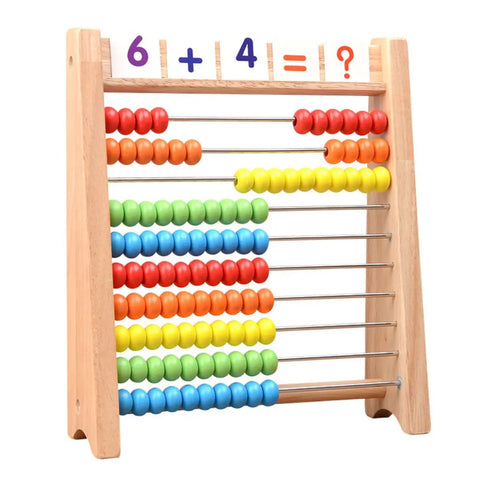
Discover the Best Math Games to Awaken the Genius in Every Child!
The Importance of Mathematical Games for Learning
Math games are a great way to learn while having fun. They allow children to develop their calculation, logic, and problem-solving skills in a fun way. One of the top products in this category is the MATHÉBOULIER™, a Montessori abacus designed to teach counting to 100.
The MATHÉBOULIER™ - A fun tool for learning to count
This colorful abacus attracts children's attention and encourages them to manipulate the beads to perform simple operations. It's an excellent tool for introducing the concepts of tens and units in a concrete and visual way.
Interactive games to stimulate learning
To keep kids entertained and entertained, it's important to offer a variety of math games. MATHÉSPINNER™ is an interactive math game that combines learning and fun.
The MATHÉSPINNER™ - A fun and educational math game
This game allows children to practice basic operations in a dynamic way. The spinner concept adds an element of chance that makes each game unique and exciting.
Learning through repetition and challenge
Flashcards are a great way to reinforce math skills through repetition. The MATHÉQUIZ™ game offers math flashcards to practice basic operations.
MATHÉQUIZ™ - Flash cards to review math
These cards allow children to practice regularly and independently. They are perfect for consolidating knowledge and improving calculation speed.
Math games for all levels
For more advanced children, the NUMÉROFUN™ game offers a multiplication odyssey. It's an excellent way to approach this operation in a fun and progressive way.

This game allows children to discover and master multiplication tables through various levels of difficulty. The adventure aspect keeps them motivated throughout the learning process.
Learning fractions visually
Fractions are often a difficult concept for children to grasp. The FRACTIONGAME™ game offers a visual and tactile approach to facilitate their understanding.

FRACTIONGAME™ - A magnetic puzzle to understand fractions
This magnetic puzzle game allows children to physically manipulate fractions, facilitating their understanding of this abstract concept. The colorful, magnetic pieces make learning fun and interactive.
The importance of regular practice
To progress in mathematics, regular practice is essential. The MATHÉROULE™ game offers daily math challenges in the form of rolls.
MATHÉROULE™ - Daily math challenges
These rolls offer a variety of math exercises to solve each day. This playful approach encourages regular practice and helps keep math skills fresh in children's minds.
Combining learning and technology
For families looking to integrate technology into math learning, the VOCABOX™ is an excellent choice. Although primarily designed for language learning, it can also be used to practice math vocabulary.
VOCABOX™ - A versatile tool for learning
This bilingual educational card reader can be adapted to include mathematical terms, helping children develop their mathematical vocabulary in French and another language.
Learning mathematics in motion
For younger children, learning basic math concepts can be accomplished through play and movement. The SPINNYFUN™ is a rotating rattle that can be used to introduce the concepts of numbers and counting.
SPINNYFUN™ - An educational rattle for toddlers
This colorful, rotating rattle can be used to teach babies to count rotations or recognize different colors, laying the foundation for future math skills.
Conclusion
Math games are a great way to make learning fun and effective. Whether through abacuses, card games, puzzles, or technology, there are many ways to help children develop their math skills. By varying approaches and adapting games to the child's level, you can create a stimulating and positive learning environment.










